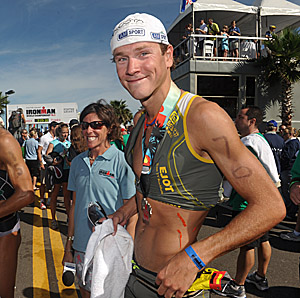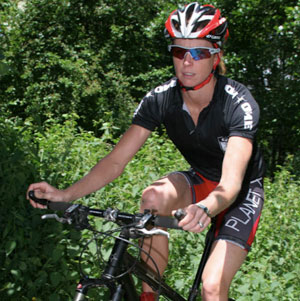Julie Dibens Q&A — Part 2
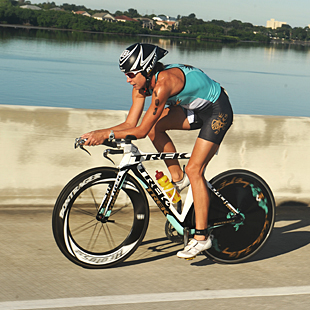
In Part 2 of an interview with Julie Dibens, the three-time Xterra World Champion and 2009 Ironman 70.3 world titlist discusses her brief exploration of professional cycling, the move up to long course triathlon, the pleasures of training with Chrissie Wellington, winning at Clearwater and her family.
CONSIDERING CYCLING
Slowtwitch: Were you ever tempted by cycling?
Julie Dibens: During that period when I was recovering from injuries after the 2004 Olympics, there were definitely times when I seriously thought of making the switch to cycling. Because the doctors were saying you’re probably not going to be able to run again.
ST: Did you discuss this with British cycling officials?
Julie: I sat down with the women’s head coach for British cycling. I had met him earlier in my triathlon career because he did some work with triathlon. He really described for me what life is like for a female cyclist. It’s very hard. Especially because Great Britain has Nicole Cook, one of the best women cyclists in the world. He said ‘You’re going to have to work for her. You will have to be a domestíque.’
ST: Where would you race? Would that include the Tour de France, or just World Championship events?
Julie : Whatever they want. Making money is a lot harder in cycling than it is in triathlon. The whole lifestyle was rough. Triathlon in a way is a lot more glamorous than women’s cycling, which is very unrewarding when you are a domestíque. And if that person doesn’t want to thank you for what you’re doing, then you’re just out there doing a job. That really kind of sank in and reminded me of how much I really do love triathlon – the lifestyle as well as the sport.
ST: How good a cyclist were you at that point?
Julie: I did the British national 10-mile time trial and came second four years in a row. I think from 2001 to 2004 I did it every year and lost to a different girl each year by margins like 2 seconds, 4 seconds. It was realty close. I did that while swimming and running and that showed me I had potential in time trialing at least
ST: How would you compare yourself to Karin Thuerig of Switzerland, an Ironman and Zofingen winner who won medals at the Olympics and World Championships in cycling?
Julie: I never raced her.
ST: You weren’t doing Ironman and she was.
Julie: Actually, the first time we raced together was Clearwater this year. [Where Thuerig, with her 30:51 swim, second-best 2:10:38 bike and 1:28:08 run finished 9th]
ST: She really raced well at tough Ironman courses like Gerardmer and Switzerland. Until Chrissie came along, she was the fastest cyclist in triathlon.
Julie: And then Chrissie came and blew everybody away. Damn Chrissie! CHUCKLES.
ST: Of all the women In triathlon, where do you rank as cyclist? Or will you say that’s for others to decide?
Julie: It's hard to tell. I like to think I am one of the strongest cyclists. And I guess it is really rare when I get out-split on the bike. But there have been a few times in the last couple years. At Ironman 70.3 Switzerland in 2008, Nicola Sprig out-split me on the bike. She is strong. But I was kind of holding back a little bit because I knew I was running well. That is where I had my fastest run split [1:22:55]
ST: You outran her?
Julie: I did. [Dibens ran 3:35 better than ITU Olympic distance star Spirig’s 1:26:30].
ST: She can outrun you in a shorter race. But given energy requirements of a full 70.3, you played it smarter?
Julie: On that day
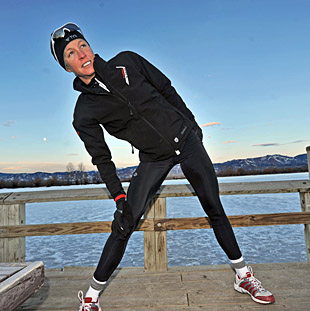
GOING LONG
ST: When did you start to feel comfortable in long course triathlon?
Julie: In 2006, when I decided to stay in triathlon, I sat down with my coach at the time, Richard Hobson. The most important thing he gave to me was the idea that you have to really enjoy what you’re doing. You have to get the hard work done. But you have to have fun at the same time. Don’t be totally obsessive about it. Have fun while you’re doing it. Be a little bit more relaxed about it. He got me interested in racing Xterra that year. He said let’s forget ITU stuff for a while. It doesn’t necessarily suit your style. Let’s go out and have some fun. Find the races you want to do. So I decided to race Xterra France. St Croix. Chicago. These were races I never had the opportunity to do before.
ST: Chicago?
Julie: It is one of the biggest races and most high profile in the US. Maybe not so much now. But it’s been around for 25 years. I didn’t do great at all those races but I loved doing them. And I think it showed me I could be great at them if we switched up the training a bit and I was a bit more focused. Biking from 2002 to 2006 was all about trying to get me to run fast. And I was biking really little. All of a sudden it was ‘Let’s try to really work on your biking and try to really make that your strength.’
ST: Did your bike training improve your run?
Julie: The most important thing for my running is just to stay healthy. Having had five surgeries in the last eight years, there’s been few times when that’s been possible. The last two surgeries were on my toe – 2005 and 2006. So I would go six months without running. I probably had maybe three years between 2000 and 2010 when I was actually able to train during the winter. Knock on wood, for the past couple of years I have been able for the most part healthy. I’ve been able to run consistently, week in and week out, all year.
ST: When you started to run consistently, what were your first half marathon splits and what have they come down to?
Julie: Most of them were right around 1:30. My fastest was 1:22 in Switzerland in 2008. And then Clearwater was 1:24 last year. I was pretty happy about that.
ST: At Boulder 5430 long course last year you ran pretty well?
Julie: I think it was about 1:27. I faded a little bit but held on after my bike.
ST: But you made such an impact on the bike you had some margin for error. [ 28:01 swim and 2:12:10 bike gave her a 5:36 lead on Wellington]
Julie: I knew I had to hammer down on the bike and put Chrissie under pressure. [ Dibens’ 1:29:13 run gave up 4:19 back to Wellington and Dibens won by 1:20]
ST: Good triathlon men including Tim O’Donnell and James Hadley say you punish them on bike training rides.
Julie: You can’t believe a word they say. They’re male. CHUCKLES.
ST: They do say they are really pushed when they go on rides with you. What is the truth?
Julie: I have a little electric engine hiding in my wheel. With Tim I make sure that he is running about 120 miles that week, so he is nice and tired.
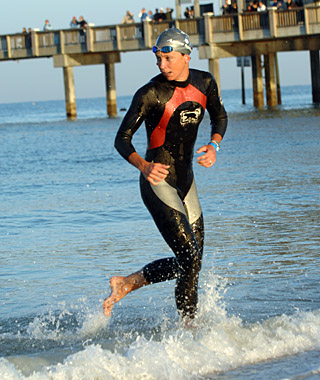
TRAINING WITH CHRISSIE
ST: It seems you and Chrissie have found each other to be good training partners. Not every day, not every discipline. But when you do ride together, it seems you both get a lot out of each other. Why do you two get along?
Julie: I think there is a mutual respect there. I know she is a great athlete. And I think she has a little respect for me. I don’t know exactly. I think I am at that stage in my career, I am out there to do the best I can and have fun doing it and I want to see other people succeed too. Especially the people I get on with. The best case scenario is this: If I am racing Chrissie, I want both of us racing to the best of our ability and the best person wins on that day. You know, I trained a little bit with Rinnie [Mirinda Carfrae] as well. And I think we will train a little bit this summer together. They would tend to be my biggest competitors.
ST: There is something about their personalities. They are secure, generous spirits. They are not small-minded. They are not jealous.
Julie: There is a genuine concern for others. They want you to do well. They are just genuinely nice people. Come race day, it’s every man for themselves. But why not use each other to make each other better?
ST: Is there any banter when you ride with Chrissie?
Julie: There will be a bit of banter sometimes. But it depends. If you see somebody is having really bad day, then you probably won’t . I don't want to make it worse. But if it’s close and I might have my nose in front I might say something. But then you are also doing it to be encouraging as well. So she drops me on a climb, I’ll say ‘Nice riding today Chrissie. You’re riding really well.’ You kind of give and take a little bit.
ST: You mention that on a long ride, as the day goes on, Chrissie will grind you into dust. But on a short ride or a hill you can leave her. What are the dynamics of that?
Julie: With me coming from Olympic distance, I think I have a little more top end power and top end speed than Chrissie. So if we are doing shorter intervals, I might be able to put a little bit of time into her. But if we went out for a 4-5 hour ride, by the end of it I’ll be hanging on for dear life. She just won’t slow down at all. She will just keep going and keep going.
I really long course is her thing. Not necessarily the short stuff. I don’t think there are any girls who can ride faster than her for 5 hours. But I’ll give it a try. CHUCLES.
ST: Do you think she might go for the Olympics in cycling? Or short course triathlon? .
Julie: I know she is thinking about giving it a go at the cycling time trial. I think that would he hard for her.
ST: No one underestimates her capabilities.
Julie: If she is going to do it, I think it will be great that she is stepping out of her comfort zone. She is so dominant at Ironman, the easy thing would be to keep doing that. So why go out and try to do something that everybody is faster than you? I wouldn’t put it past her. But it definitely won’t be easy. Because these girls are fast. She will have to sacrifice swimming and running. I do not think she can expect to be so fast over a 20k bike ride and still be training at running and swimming.
ST: People wonder how she is so fast at Ironman. Mark Allen said look at her physically – she has a great power to weight ratio. Strong muscles.
Julie: Definitely! Have you ever looked at her calves? Whooh! Yeah they are impressive. I’m not going to say she is the perfect specimen for Ironman. But pretty close.
ST: What might she do to get into Olympic cycling?
Julie: I think she would have to work on her aerodynamics for sure. I am not sure she has necessarily done all that stuff. All the top cycling girls will be in the wind tunnel checking things out. And she’ll need to do a lot more short intensity stuff. I don’t believe she do a lot of that now. She doesn’t need to.
ST: She has the capability of adapting to the stress she will apply in that new format. It may not be as quixotic as basketball legend Michael Jordan taking up baseball. He never got beyond the minor league level in his second sport. But you still feel it will be a longshot for Chrissie?
Julie: It is almost like getting the best 1500 meter swimmers out there and get them to start training for the 50 and 200 meter sprint. There have been a couple of guys who have done it. I think there is a South African guy who started out as a 1500 meter swimmer who did that and he is one of the fastest sprinters. But you rarely see people as they get older step down in distance.
ST: Given your record, if anyone might have luck trying that it might be you?
Julie: I thought about it in 2006. If I was injured and unable to run again, maybe it would be something I’d consider.
ST: But you didn’t face the clear cut situation as faced by Kristen Armstrong, who had osteoarthritis and could never run again.
Julie: No I didn’t. Plus, I have to enjoy the sport. There were times, especially when I was injured, I kind of lost the love for triathlon. Now I pick races I want to do because I think I will enjoy them.
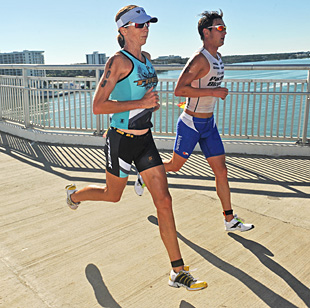
PERFECTIONIST?
ST: Are you your toughest critic in training and racing? Or do you let yourself off easy?
Julie: I think I am a perfectionist in some ways. But in other ways I’m not. Depends what it is.
ST: About a race?
Julie: Yeah. A little bit. Like I really like to make sure I've given everything I could on the day to get the most out of myself. If I do that, I’m normally pretty happy with things.
A World Championship at Ironman 70.3 in Clearwater last year
ST: Someone on the outside would have thought you executed a perfect race at Clearwater in 2009. What do you think?
Julie: It wasn't a perfect race for sure. I believe I could have run better on the day. And I could have dealt better with the guys who rode by. I kind of got frustrated at that point. I think it got to me a little bit mentally. .
ST: Partly irritated that women behind you might have been swept up with them?
Julie: No, I was more irritated in that I wasn't able to race my race. I was pulled up with this group of guys. I could have quite easily sat in that pack. But I knew it wasn’t fair to the girls behind. So you kind of wonder what to do. Do I just ride with the race?
ST: What can you do? It’s like the plague of locusts. Do you stop and let a pack of 40 go by?
Julie: That is what I was thinking. I don't want to win this race by sitting in with a group of 30 guys. I want to win this fair and square. Do I ride by myself or whatever? I felt I kept them at a fair distance. And I felt I could stay with many of them. Then there were times when guys were passing me. Which is fair enough. But there were also times when I had to slam on my brakes. [Chief marshal] Jimmy [Riccitello] came up to me at one point and said ‘Julie, you got to let them all go.’ I said ‘You want me to stop [pedaling] for a while? It’s a race.’ So it is frustrating. I just wish mentally I kept my focus a little bit. I definitely lost my focus in the midst of that. I just remember shaking my head at some of the photographers and the marshals and the cameras. I was thinking: ’What is this? This is supposed to be a world championship.’ I’m not supposed to be freewheeling in a race. I want to be hammering it. In that respect it definitely wasn’t perfect.
ST: Some people criticized the leading women. Some of them criticized you for riding for a while in the men’s pack. What do you say?
Julie: I am the only pro, man or woman, who rode the first 35 miles all by myself. I rode by far the most miles under my own power of anyone in the field. They can criticize me all they want, but I know I rode as fair as anyone.
ST: You were the first woman to break the 4-hour barrier at the half Ironman/70.3 distance. Given the conditions, is that significant?
Julie: It is obviously a great race with a great field. But And I won’t be surprised if people go way faster next year. I think it is just going to keep getting faster and faster. Seventy point three is still relatively new.
ST: Women could get better?
Julie: Yes. You are going to get people stepping up from Olympic distance at some point. People like Lisa Norden and Emma Moffat. Hopefully when they get into it I will be done and dusted, with my feet up [on the couch]. Because on paper, you have to think they will be incredible 70.3 athletes.
ST: Has life changed much since your double world championship? Do you get more attention in the British press?
Julie: I do in the triathlon press. But with Ironman, Ironman 70.3 and Xterra athletes, there is not so much interest in the mainstream press. There was a big piece in a newspaper about the three British triathlete world champions – Alistair Brownlee, Chrissie Wellington and myself. But most of the attention is focused on Alistair because he will be a medal favorite in the 2012 Olympics in London.
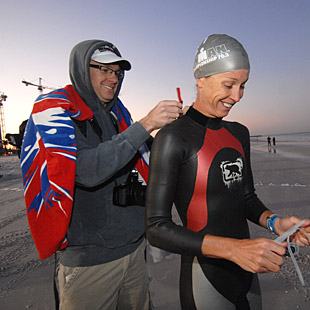
TEMPERAMENT, FAMILY, READING
ST: You seem to be a person with one of the most self possession, the greatest calm under pressure. You should be a fighter pilot. Whenever were you overwhelmed emotionally and your calm and cool façade was tested?
Julie: When did I lose it? I’ve always been pretty calm, level headed.
ST: Your most trying moments?
Julie: Three things come to mind,. One was when I got Injured right before the Sydney Olympics. That was a really hard time to deal with. It took me a while to want to get back into things. Then, after the whole experience in Athens – the politics, the race, my injury.
ST: That crazy steep course.
Julie: Having my whole Olympics dream taken away and ruined. I really didn’t want to have anything to do with the Olympics ever again.
ST: It was like your dream got slashed..
Julie: Yes. The third one was Clearwater in 2007. Up until 10k on the run, everybody thought that was race was mine to win. To fade as dramatically as I did was quite hard to take.
ST: You were mad at yourself?
Julie: Yes. I just got mad at myself and frustrated. That race was mine for the taking and I felt I blew it.
ST: Did that solidify your ambition to win that race?
Julie: That is where the dream really started to take shape. I really believed that I could, on my day, win that race. Then to go back in 2008 and not have a great race at all made me more determined to go back and keep trying.
ST: You ever have a tough situation as a kid growing up, say with mean girls in school, where you were disappointed or upset?
Julie: Sure I did. I must have blocked it out. All in all, I was pretty happy as a kid. I went to boarding school when I was young. I was 11 when I first went. I cried for the first month. Then I absolutely loved it. I went to Millfield – it’s renowned as one of the best sports schools in the UK. It gave me an opportunity to really enjoy doing sports. I pretty much did everything.
ST: Tell us about your family?
Julie: Michael is my dad. My mother is Alix. Last name is Ricketts. My dad is a solicitor, he’s recently retired . My mom volunteers with autistic kids and still does some of that now. I have a brother Justin Ricketts who lives in Sydney and works in sports marketing and sport management. He sailed round the world a couple years ago with 2 or 3 other people. He sold everything and they bought a boat and started in Capetown, South Africa. When they got to Sydney, he decided he'd had enough and stayed there and the others carried on.
ST: You remember the games played as a little kid?
Julie: My brother was a big influence. Whatever he wanted to do I had to do. So if he wanted to throw a rugby ball around, I would do it. If he wanted to play catch, play hide and seek, play cricket, go swimming I would do whatever he wanted to do. He would always make up the rules as we go along so he’d always win. LAUGHS
ST: Your major in University?
Julie: Kinesiology. And I did a masters in exercise physiology. It seems like forever ago. But I get to use most of it in my everyday life.
ST: Ever see yourself working full time as a coach and physiologist?
Julie: Probably not now. But I do a little bit of coaching on the side. I use some of that in my coaching. And I can see myself getting more into that when I’m done competing. Right now I do triathlon coaching online for a few age groupers and a couple of Xterra pros. So I really enjoy working with them. It’s hard at times when I have a really busy racing schedule.
ST: What do you like to read?
Julie: Pretty much anything. Books. Fiction. Nonfiction. Right now I am reading the most recent Dan Brown book. I like suspense. I like the John Grisham things a lot – and your really girlie romantic novels as well.
ST: No kidding?
Julie: And I like reading autobiographies. I really enjoyed reading Andrew Agassi’s book. I read that fairly recently.
ST: How did you react to his open admissions about using amphetamines?
Julie: It was really sad that it had gotten to that point. I think the thing that really struck home in that book was up until the last few years, he really didn’t enjoy playing tennis at all from the age of six. How can you do something like that for so long and not enjoy it?


